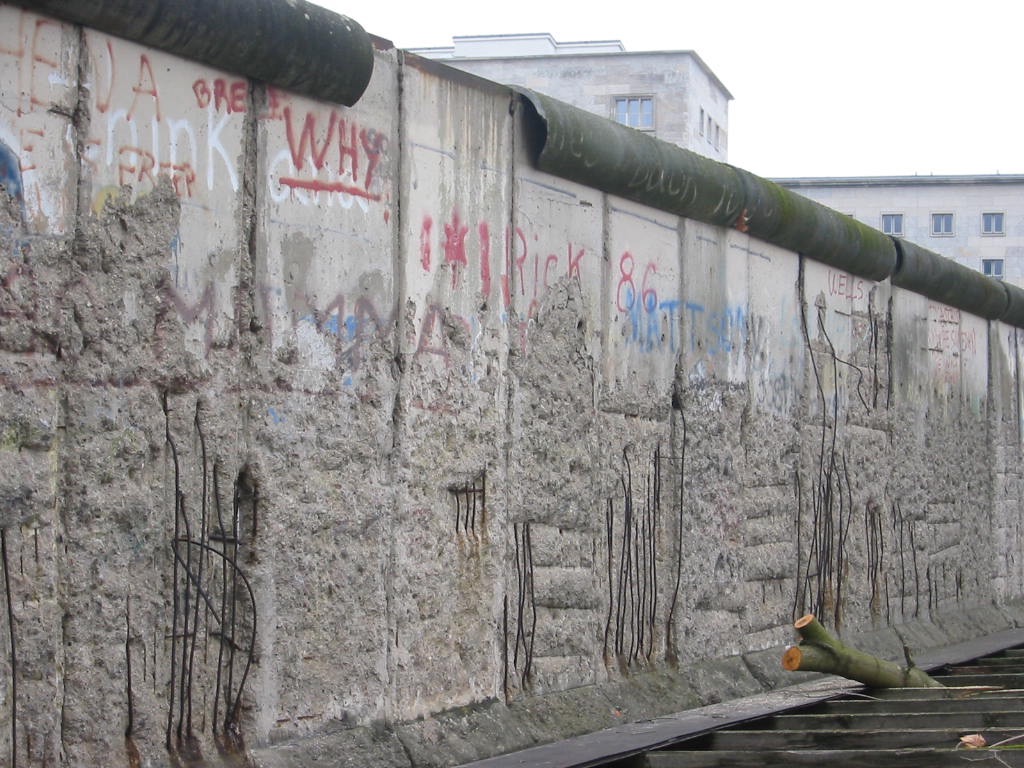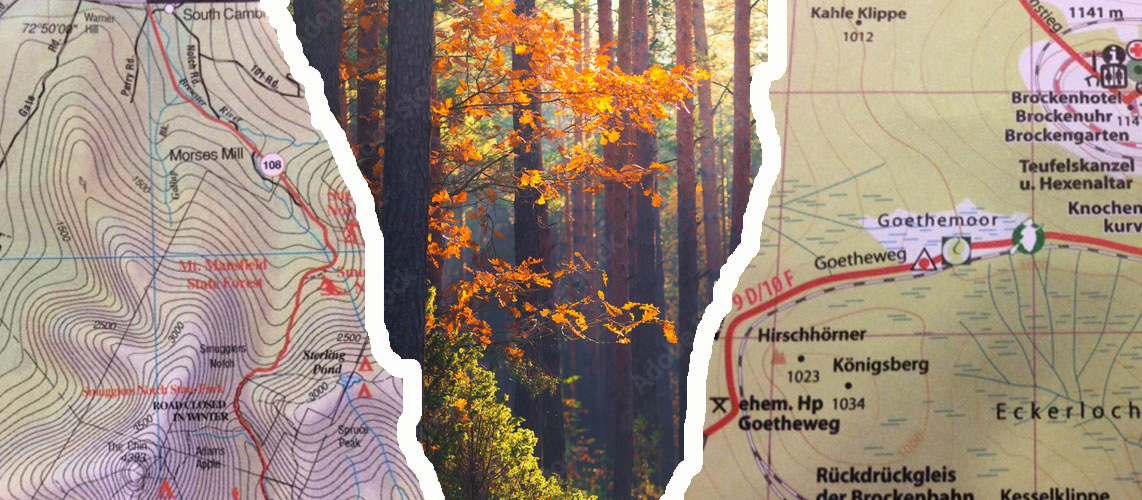
Just like the Iron Curtain once separated families and friends, today’s politically polarized divisions cut through families and ruin friendships. And they cause just as much pain. Is there anything we can do?
Here’s an op-ed I wrote for the Montpelier Times-Argus
I grew up in a divided country, and I don’t just mean polarized. I mean divided by a real, on-the-ground border wall of steel and concrete. The country was Germany and the wall was the Iron Curtain; the Berlin Wall its famous emblem.
It was a formidable, highly militarized installation – not one wall, but two, with all sorts of deadly obstacles in between. For forty years, it separated families and friends and caused immense pain on both sides.
Then, in the fall of 1989, the incredible happened: peaceful but determined East German citizens brought down the Berlin Wall, which meant that the nearly 900-mile-long border that divided Germany into two states also became obsolete. The Iron Curtain, that draconian symbol of a polarized world, was quietly dismantled and the Cold War came to an end.
A wave of euphoria swept the globe: If a Peaceful Revolution could bring down the world’s most forbidding border wall, anything seemed possible. Perhaps we could even live in a world without walls?
This is not how things went. While in 1989 only fifteen border walls existed in the world, by 2017 there were seventy. Worse, we seem to be busy building border walls in our heads. Empathy walls, sociologist Arlie Russell Hochschild calls them: “An empathy wall is an obstacle to deep understanding of another person, one that can make us feel indifferent or even hostile to those who hold different beliefs or whose childhood is rooted in different circumstances.”
In the U.S., the Pew Research Center recently found that nearly 80% of Americans now have just a few or no friends at all across the aisle – and that they see their differences as ones of basic morality, not just policy disagreements. As Amy Chua put it in Political Tribes (2018): “The Left believes that right-wing tribalism – bigotry, racism – is tearing the country apart. The Right believes that left-wing tribalism – identity politics, political correctness – is tearing the country apart.”
Just like the Iron Curtain once separated family and friends, today’s politically polarized divisions cut through families and ruin friendships. And they cause just as much pain. Some fear that this country could descend into a new civil war. Some, like historian Manisha Sinha, say that the Civil War never truly ended, that old enmities are bubbling up. History, after all, does not mean that things that happened leave no trace.
What does all of this mean for where we go from here, though? Do the present divisions have to be so polarizing? Do we have to demonize the “other” side?
The answer may well depend on where we place our attention. In a recent Forbes interview, conflict researcher Helena Puig Larrauri shared a key insight about our current dilemma: “The majority of people aren’t driving polarization, it is happening to them and they may not be aware of it.”
They may not be aware of it. The hidden force, in this age of social media, lies in the algorithms that are designed to exploit human emotions – especially fear, but also the brain’s evolutionary need for interpersonal connection.
Do we want to be manipulated by algorithms? If we don’t, how do we get beyond the dilemma in which we find ourselves? How do we depolarize the country and ourselves?
The good news is that not unlike the steel and concrete of the Iron Curtain, the divisions in society can be dismantled, too. Doing this will also require some work on the walls in our own heads. I am not saying that it will be easy, but I wager it will be worthwhile.
A few years ago, I decided to be an anthropologist in my home country and to hear firsthand what traces of its former division still lingered. One thing I learned was that even people who speak the same language can live in profoundly different worlds of meaning. Perhaps this is not surprising in light of the four decades when Germans were separated by barbed wire, land mines, and sharpshooters. But much of the disconnect stems from the time after Reunification.
Among the eastern Germans I spoke to, there are few whose lives were not shaken up by unemployment or other major kinds of disruption. Of those over fifty, many never found jobs again. While the unemployment money helped pay the bills, it did little to repair their lost sense of self-worth. Even those who found new opportunities saw their entire frame of reference shift, from the way work was organized to the way one went about paying taxes or getting a driver’s license. Many felt that their fellow citizens in the west had no inkling of the upheaval they lived through.
By now, the once-geographical division is becoming increasingly blurred; other layers have piled on top. Some of those layers stem from larger trends that affect people around the world: the unpredictable flow of capital and jobs that came with globalization, the shift from an industrial to a services-based economy, the arrival of large numbers of refugees. The same issues that preoccupy and polarize Americans.
Here in the U.S., too, the lines of division come in layers, and here, too, they do not neatly align with geography: lines between the coastal “elites” and people in struggling coal mining regions; lines between “anywheres” – those who have favorite cafés in Vienna or Madrid and can work from any place with an internet connection – and the “somewheres,” those who feel deeply rooted to the land and are tied to it by the work of their hands.
We all live in different worlds of meaning. What if, rather than get appalled or break off contact in the face of differing views, we asked questions to learn about other people’s worlds, like an anthropologist might?
We don’t need to rely on social media to address our need for human connection. We can attend to those needs ourselves, and in the process rebuild the tattered social fabric. A conversation with a person with whom we disagree may not seem like an obvious place to start, and it does take a bit of courage. But courage builds upon itself, and the rewards can be profound. When my own supply of courage flags, I often think of those East German protesters who brought down the Berlin Wall. Speaking out against their iron-fisted government required a different order of daring than it takes to talk to someone who voted differently from me in the last election. Maybe we polarized Americans can stage a Peaceful Revolution by relating directly with our fellow citizens.
Fortunately, too, we don’t have to climb this mountain alone. We can work together through an organization such as Braver Angels (braverangels.org), a national citizens organization that offers forums for people of different political views to relate to each other with respect and curiosity. The group takes its name from something Abraham Lincoln said to his fellow citizens on the eve of the Civil War:
“Countrymen, we are not enemies, but friends. We must not be enemies. Though passion may have strained, it must not break our bonds of affection. The mystic chord of memory will swell when again touched, as surely they will be, by the better angels of our nature.” (Braver Angels changed “better” to “braver” to reflect its call for intellectual bravery.)
Participants in Braver Angels workshops do not set out to change the other side’s mind or to drive stakes in the ground to prove that their own position is right. Perhaps being “right” is overrated anyway. Positions can evolve, and insisting on being right rarely proves effective in convincing anyone else.
What happens at these meetings is radical, humane listening. We get glimpses into other people’s lives and their worlds of meaning. People on the other side come into focus as complex human beings.
In the process, we often find that the barriers between us are less like the Iron Curtain and more like a screen door.


Congratulations on this publication in the Times Argus and kudos for your commitment to bridging the divide. Supremely important work in these troubling times. It’s easier to see the Iron Curtain of fixed ideologies in others, but more difficult and important to look for them in ourselves. I’m going to try to remind myself to update my views as new information comes in, to realize that my perspective is limited, and to use the word “maybe” more often.
Great Eric, I knew I could count on you! So true that it’s easier to see the Iron Curtains of fixed ideologies in others than ourselves.
Excellent piece, Kerstin! I love the metaphor of walls – that’s exactly what we’re building literally and figuratively. We need to counteract that.
Interesting insights, Kerstin. And so wonderful to be offered a way to engage…
Thanks Julie! I suspect you are already a Braver Angel at heart…
Kerstin, I applaud your insights and sharing them. I also grew up in the divided Germany and now living in the USA, again find myself living in a divided country. Your suggestions are right on. Thank You! Reiner
Danke Reiner! How did you come across my blog?